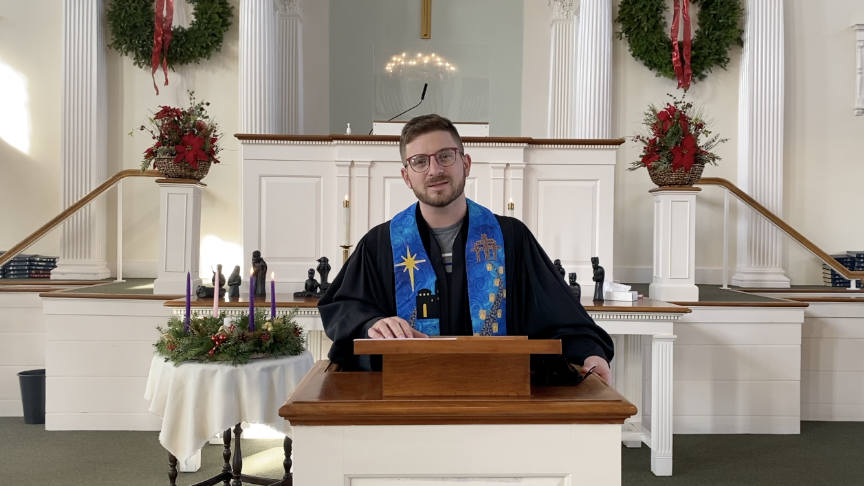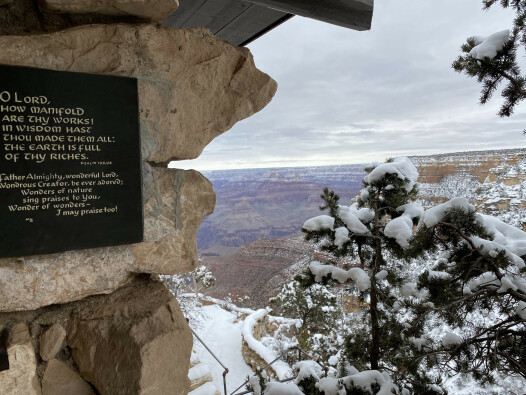Advent 2: Faith From the Wilderness

Speaker: The Rev. Jake Miles Joseph
December 6, 2020
Sermon, Second Sunday of Advent, 6 December 2020
The Rev. Jake Miles Joseph
From the Wilderness: A Sudden Christmas

Aside from an occasional Easter Sunday service, early morning airport runs to catch a flight, and the rare all-nighter in college, I have only once in my life purposely risen before dawn for the simple and express reason of watching a sunrise. The dawn morning of January 1, 2020, Gerhard and I were on our first vacation since moving to Connecticut. We chose to ring in this past new year on the South Rim of the Grand Canyon—a bucket list experience suitable for an auspicious number like 2020.
It was a particularly dry and cold morning with a fresh layer of snow covering the high plains plateau of purple sage and twisty, ancient Juniper trees. We were truly in the wilderness. Not an urban wilderness like Westwoods in Guilford, but out in a cabin in a profound and real wilderness. Our early wake-up time was worth it. As the sun rose, it was reflected off the stillness of the snow coating the red canyon edge deeper and deeper seemingly forever. It looked like the first day of all time. The colors of the miles deep cliffs and canyons turned from deep purples to pinks and reds. All of the potential energy for 2020 felt like it was held in the stillness of the wilderness on that cold morning. Shivering and holding my hot chocolate, I looked out and saw and felt pure love.
Sometimes, since seminary, Scripture just comes to me whether invited or uninvited. As I stood there, parts of this verse swept through my mind like the rapids of the Colorado River below:
“The beginning of the good news of Jesus Christ, the Son of God. As it is written in the prophet Isaiah, “See, I am sending my messenger ahead of you, who will prepare your way; the voice of one crying out in the wilderness: ‘Prepare the way of the Lord, make his paths straight,’” John the baptizer appeared in the wilderness, proclaiming a baptism of repentance for the forgiveness of sins…for forgiveness of where we have missed the mark…”
At the beginning of this year of wonder and mystery and newness, it was this scripture that came to me at the edge of the wilderness of the Grand Canyon. As the sun rose over the cold depths of 6 million years of geology, with it came a sense of God’s love through creation, through nature, through the boundlessness of ancient history, and through the wonder of the unknown and the yet to be learned. To me, you see, the wilderness makes me feel right-sized (not small) in humility before the great Love of the maker of life and matter. There is a reason that in the Gospel of Mark the coming of Jesus is shouted from a voice in the wilderness. It is the place where we gain perspective capable of receiving God’s love.
Little did I know that sense of love emanating and radiating from the canyon on New Year’s morning 2020 was a gift from God to sustain me in all of the unknown and new learnings of this year. I don’t know how I would have made it without that grounding on January 1st. Here we are, almost a full year later, and we are called by Scripture to Christmas from the honesty, wildness, mystery and love of creation found in wilderness.
This Scripture passage for today, Mark 1:1-8 is really interesting. It is the entire Advent, Christmas, and Epiphany season for this gospel. This is it—starting with, “The beginning of the good news of Jesus Christ, the Son of God,” wilderness experience, and ending with his baptism all in 8 short verses. In the very next verse, starting with Mark 1:9, Jesus is an adult and we jump smack dab into the middle of his ministry. Today, in this wilderness time, we explore Christmas according to Mark. While many see starkness and fear and sad brevity (a very unsophisticated view of wilderness in my opinion as a Westerner), I choose to see the depth of God’s love for us and hope in this version of Christmas.
Is something missing here? Yes, almost everything is missing. What does it mean for our faith if this story about a voice calling out in the wilderness were accepted as the whole Christmas story? Is the Gospel of Mark an abridged Christmas story or rather a “back to the basics” (sunrise, breathing, stillness, love via matter and life, essence) Christmas story? This macro question mirrors our question for this year as our traditions morph and crumble into something new and different. Is this an abridged and insufficient Christmas Season or conversely is it a back to the basics refreshing sort of Christmas? Perhaps a little of both…
It is no accident that the founder of the UCC’s Pacific School of Religion’s Center for LGBT Studies in Ministry and Religion, Professor Mary Ann Tolbert also happens to be one of the most highly respected Markan or Gospel of Mark scholars. You see, Mark, like progressive religion, gets back to the basics of spirituality and love. What is it that really matters?
Mark gets us back to the basics of meaning and the church in a way that helps us reset all of the norms and prejudices of tradition. In her book, Sowing the Gospel: Mark’s World in Literary-Historical Perspective, Tolbert writes, “Whether because of the pervasive influence of Augustine’s view that Mark was an abbreviation of Matthew or whether because of the baffling portrait of Jesus, the Gospel of Mark received minimal attention throughout most of the centuries of church history. [Modern scholarship, however, has found that] Mark was not an abbreviation of Matthew or a muddled contradiction of Matthew and Luke but [is in fact] the earliest extant Gospel and one of the sources used by the authors of Matthew and Luke…. In so many ways, Jesus, as Mark characterizes him, epitomizes the situation…caught between suffering and hope, the breakdown of the old and the promise of the new.”[1]
Let me break this down for us today: This is not an accidental Gospel, it isn’t a fragment, and it isn’t without a clear Christmas and Advent message so needed for us today! The authors of Mark may very well have known the other Christmas stories of Mary and Joseph and the rest, but they chose to tell a different story, a simpler story, a right-sized story about a voice calling out from the wilderness. Mark, the oldest Gospel upon which the others came into being, tells a story of the origins of Christ as four things:
First, there is good news. Putting all of the bows and Christmas stuff aside (for just a second), there is good news of Jesus Christ, the Son of God. Like the starkness of looking at a rock canyon, nothing is hidden. This is the whole story put into a first sentence. The love of God has come in Jesus.
Second, this came from the prophets of old like the voice of one crying out in the wilderness. John the Baptist echoes the cry of the ancients by also appearing in the wilderness and speaking of the wonder of Christ. Our faith and salvation come from a wilderness perspective tradition—a perspective that grounds us in the basics of God’s love through Creation. It is rooted in the awe-factor that we are alive and God made all of this beauty around us.
Third, this Jesus, is caught in the realness of life, as Tolbert says, “caught between suffering and hope, the breakdown of the old and the promise of the new.” The Jesus of Mark’s gospel is one who has almost come from the wilderness. Jesus in Mark is a lot like the Christopher McCandless story from the book and/or movie Into the Wild. He is a person with deep mystery, deep connection to the wilderness, and a sense of love that is beyond words of understanding or the control and management of human institutions. Jesus is wild in Mark.
Fourth, we must see that the mystery and simplicity here is intentional. The authors of the Gospel of Mark, according to Tolbert, were not simpletons or without purpose. They told the story as they understood it needing to be told. They told us the Christmas story we need to hear in 2020. The year when all of the things have either been revoked, removed, or revamped—we are reminded that the good news, the story of the love came from a voice crying out from the wilderness. That is the root of our love bigger than our imaginations can carry, and it is no accident.
I go back to the pink and red cliffs of the Grand Canyon covered in fresh snow that dawn morning—January 1, 2020—and I remember the love of God radiating from the colors of that place. It was scary, big, overwhelming—and yet from it came the right-sized reminder of human humility before the great love of God: My Creator of Spirit/ Life/ Matter, Sustainer, and Redeemer.
Likewise, Christmas in the Gospel According to Mark isn’t complicated, it isn’t festive, it leaves much to be desired—but maybe it offers us greater hope in this time because it is about the basics. It offers us renewed perspective about what matters. Our faith is called from the wilderness and we reply with awe, wonder, and renewed assurance of God’s love as Emmanuel returns again. Caught with Jesus between suffering and hope, the breakdown of the old and the promise of the new… we know that we will emerge from this Spiritual wilderness with greater perspective of God’s loving embrace all our lives long and into the next.
Amen.
[1] Mary Ann Tolbert, Sowing the Gospel: Mark’s World in Literary-Historical Perspective (Minneapolis, Minnesota: Augsburg Fortress Press, 1989), 19, 47.

